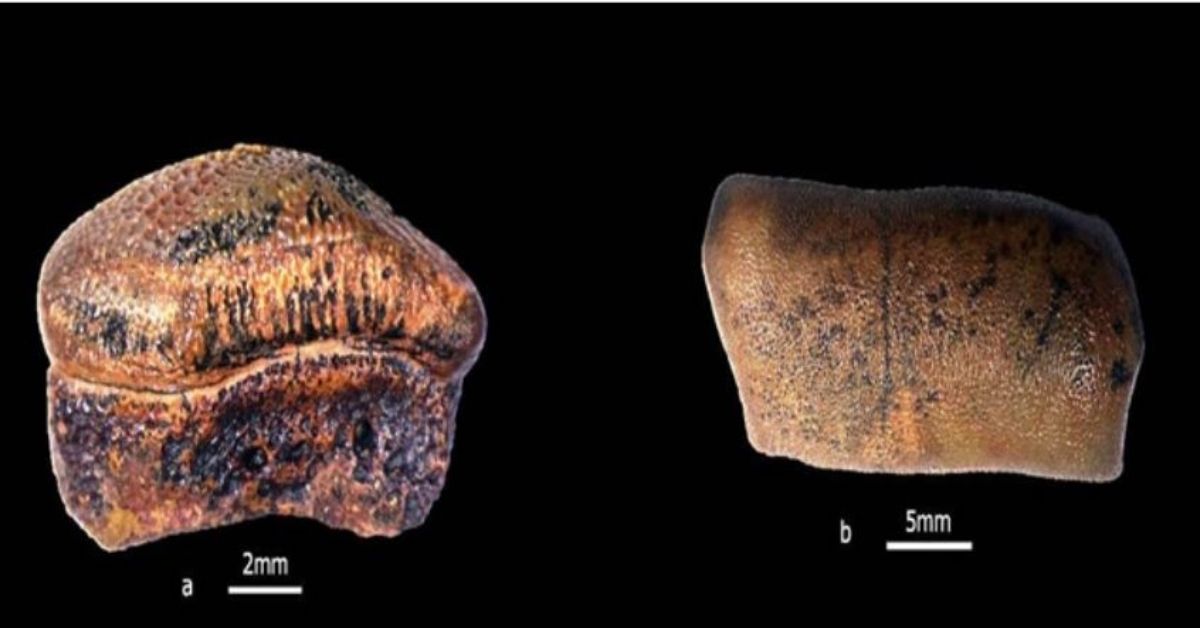How Indian Scientists Uncovered a Jurassic-Era Shark Species in Jaisalmer
The fossil was found by a team of officers of the Jaipur-based Western Region office of the Geological Survey of India (GSI).

In a rare discovery, researchers have found evidence of a new species of an extinct group of sharks called hybodont from the deserts of Jaisalmer in Rajasthan. They found the teeth of the shark species in ancient rocks that were dated between 160 and 168 million years ago.
The fossil, which is of crushing teeth, was found by a team of officers of the Jaipur-based Western Region office of the Geological Survey of India (GSI). It comprised Krishna Kumar, Pragya Pandey, Triparna Ghosh, and Debasish Bhattacharya. They have published a report on their findings in Historical Biology, a Journal of Palaeontology of international repute, in its August 2021 issue.
Hybodont was a dominant group of fishes in both marine and fluvial environments during the Triassic period and early Jurassic times (252-174 million years ago). They, however, started to decline in marine environments from the Middle Jurassic period (174-163 million years ago) onwards until they formed a relatively minor component of open-marine shark assemblages. They finally became extinct at the end of the Cretaceous time 65 million years ago.
Hybodont shark teeth (Strophodusjaisalmerensis), from Jaisalmer Formation, Jaisalmer, Rajasthan.
Significantly, the newly discovered fossil was found to belong to the genus Strophodus. It is the first time a species belonging to the genus Strophodus has been identified from the Indian subcontinent. Further, it is only the third such record from Asia — the other two being from Japan and Thailand.
The research team has named it Strophodusjaisalmerensis after the location where it was found. It has recently been included in Sharkreferences.com, an international platform operating in association with several global organisations, including the International Union for Conservation of Nature (IUCN) and Species Survival Commission (SSC).
This discovery marks an important milestone in the study of Jurassic vertebrate fossils in the Jaisalmer region of Rajasthan, and it opens a new window for further research in the domain of vertebrate fossils.
Dr Sunil Bajpai, Head of the Department, Department of Earth Sciences, Indian Institute of Technology-Roorkee, who is a co-author of this publication, played a significant role in the identification and documentation of this important discovery.
The Geological Survey of India was set up in 1851 primarily to find coal deposits for the Railways. Over the years, it has not only grown into a repository of geo-science information required in various fields in the country but has also attained the status of a geo-scientific organisation of international repute. Its main functions relate to creating and updating national geoscientific information and mineral resource assessment. These objectives are achieved through ground surveys, air-borne and marine surveys, mineral prospecting and investigations, multi-disciplinary geoscientific, geo-technical, geo-environmental and natural hazards studies, glaciology, seismic tectonic study, and carrying out fundamental research.
GSI’s core competence in survey and mapping is continuously enhanced through accretion, management, coordination and utilisation of spatial databases (including those acquired through remote sensing). GSI uses the latest computer-based technologies for the dissemination of geoscientific information and spatial data, through cooperation and collaboration with other stakeholders in the Geo-informatics sector.
(Article Courtesy: India Science Wire)
If you found our stories insightful, informative, or even just enjoyable, we invite you to consider making a voluntary payment to support the work we do at The Better India. Your contribution helps us continue producing quality content that educates, inspires, and drives positive change.
Choose one of the payment options below for your contribution-
By paying for the stories you value, you directly contribute to sustaining our efforts focused on making a difference in the world. Together, let's ensure that impactful stories continue to be told and shared, enriching lives and communities alike.
Thank you for your support. Here are some frequently asked questions you might find helpful to know why you are contributing?













